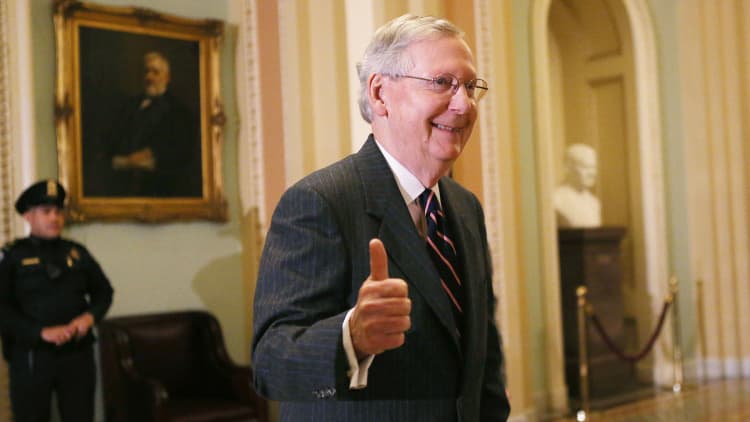
The Senate on Tuesday voted by the narrowest margin to move forward with its Obamacare repeal push, a significant step for Republicans that still leaves senators searching for an agreement on how best to follow through on a campaign promise that has defined most of the last decade.
Vice President Mike Pence was forced to break a tie as the Senate voted 51-50 to start debate on proposals to change the landmark health-care law. The vote comes after weeks of setbacks for Republicans as party divisions stalled multiple versions of their plans to overhaul the American health-care system.
Passing the motion to proceed does not mean Republicans have a consensus on a bill they can pass. The procedural vote starts a complicated period in which senators will float varying alternatives for reshaping Obamacare.
Sens. Susan Collins, R-Maine, and Lisa Murkowski, R-Alaska, who have pushed for a bipartisan Obamacare fix, opposed the motion to proceed. The return of Sen. John McCain, R-Ariz., to the Senate on Tuesday after a surgery for a brain tumor meant it would have taken three "no" votes to block the motion.
After the vote, Senate Majority Leader Mitch McConnell said "this is just the beginning" and added that he did not want to "spike the football." The Kentucky Republican said he hopes to have a measure that can pass the Senate and advance to the House or a conference between the House and Senate by the "end of the week."
"We're pleased to have been able to take the first step in that direction," he said.
The Senate will navigate a complicated path to reach any agreement. One possible route could end with a so-called skinny repeal, according to NBC News, which cited two Senate sources.
The "skinny" repeal would eliminate the individual mandate penalty, the employer mandate penalty and the medical device tax from the Affordable Care Act, according to NBC.
But before that could happen, the Senate would "move on to debate and vote on a variety of approaches to the bill," like the repeal now and replace later plan that key conservatives support, NBC reported. That would likely get blocked.
The chamber could then field some version of the replacement plan that stalled out recently. The latest version of the replacement plan is expected to include amendments from both Sens. Ted Cruz, R-Tex., and Rob Portman, R-Ohio, according to NBC. Cruz's amendment would allow insurers to sell skimpier plans as long as they also offer Obamacare-compliant plans. Portman's tweak would tack on $100 billion in additional Medicaid spending, according to NBC.
As the Congressional Budget Office has scored neither of those amendments, the tweaks may not comply with Senate rules that allow a simple majority vote, NBC reported. Republicans therefore would not be able to get the eight Democratic votes needed to reach 60 votes.
The vote for a partial, "skinny" repeal may follow that.
As the roll call vote was about to begin Tuesday in the Senate, at least 10 protesters in the chamber broke out in chants of "Kill the bill!" and "Shame!"
The motion's passage came after at least three senators who previously opposed proceeding to a version of a health-care bill decided to back Tuesday's motion: Sens. Rand Paul, R-Ky., Dean Heller, R-Nev., and Shelley Moore Captio, R-W.V.
McCain returned to the Senate to a standing ovation just days after revealing he has cancer and supported the motion to proceed. McCain criticized the process that led to the health-care bill and called for the Senate to return to the usual process like committee hearings — despite backing the Republican effort on Tuesday.
However, he added that he "will not vote for the bill as it is today."
After the vote, President Donald Trump thanked McCain — who he called a "brave man" — for returning to cast his vote. He called the motion a "big step" during a joint press conference with the prime minister of Lebanon.
Trump said he believes that Republicans will come up with a plan that is "really, really wonderful" for Americans.
"I think you're going to have a great health care. This is the beginning of the end for the disaster known as Obamacare," Trump said.
Trump ramped up his engagement and applied more pressure on senators in the days before the vote. But he has often appeared disengaged on the policy details contained in the plans to overhaul the U.S. health-care system.
Any of the existing plans that the Senate could take up face tough political realities.
Congressional Budget Office estimates of uninsured rates and consumer costs under both the repeal and replace and the repeal-first plans' effects stirred concerns among more moderate Republicans.


